Fairness in the workplace is monumentally important! A core part of this means respecting your colleagues enough to do your fair share of the work without trying to ‘game’ the system or dump your responsibilities on someone else. When people think their coworkers are actively avoiding their duties, it can lead to a ton of tension and resentment. Nobody likes free riders and toxic colleagues, especially when they have to pick up after them. That, in turn, can harm morale and the entire organization.
The popular Petty Revenge online group really enjoyed user u/SharpFlyyngAxe’s witty story about how he solved the issue of a particularly lazy new hire at the hospital where he’d been working. It’s something to keep in mind if you ever feel frustrated at work. Scroll down for the full story. Meanwhile, Bored Panda has reached out to the author for further comment, and we’ll update the article once we hear back from him.
Nobody likes working alongside unreliable, dishonest, and entitled people who dodge their responsibilities. It’s bad for morale and can mean more work on your plate

Image credits: Borna Hržina / unsplash (not the actual photo)
A hospital worker shared how he was so tired of a new hire’s laziness, he ended up getting him fired
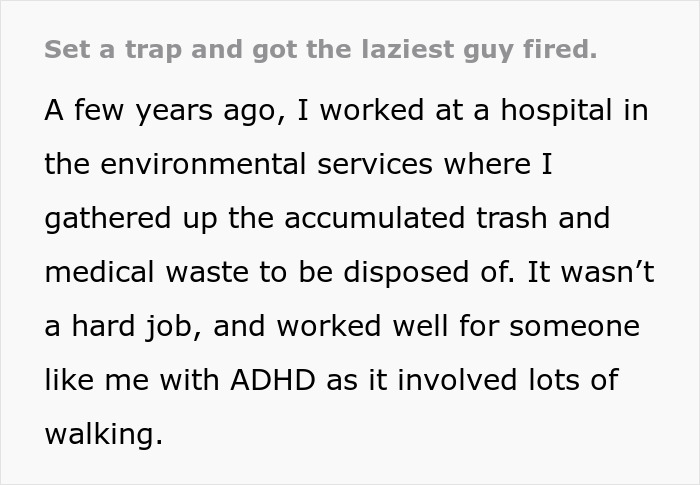
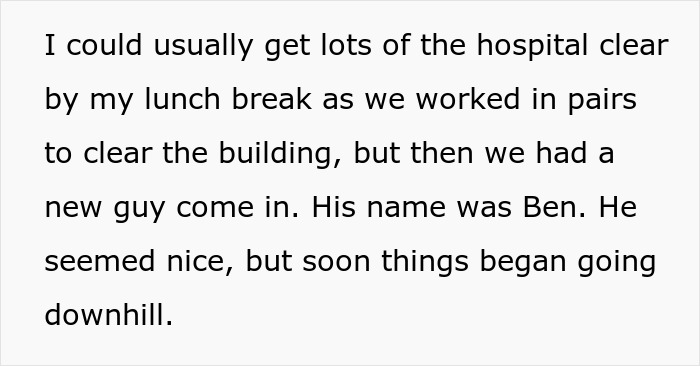

Image credits: Kenny Eliason / unsplash (not the actual photo)
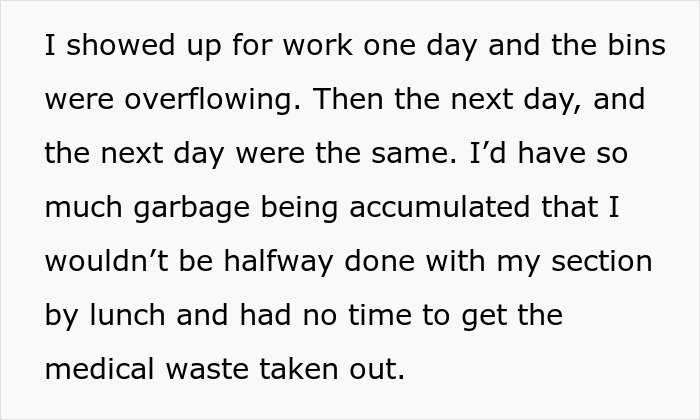
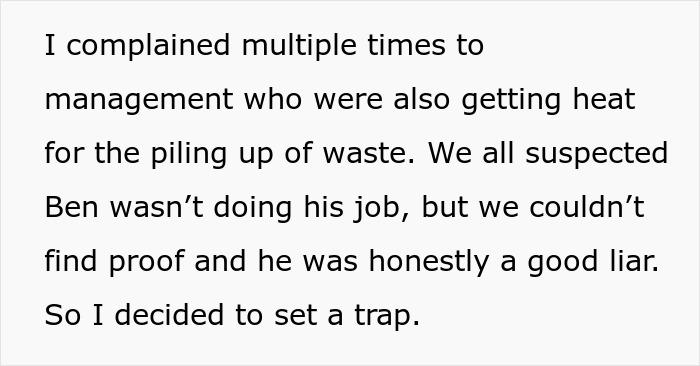
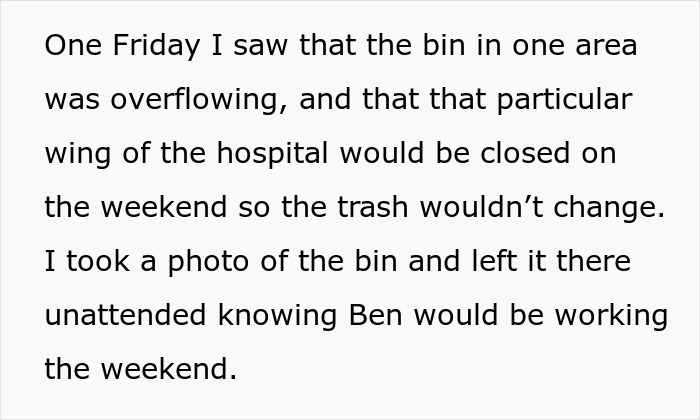

Image credits: Getty Images / unsplash (not the actual photo)


Image credits: SharpFlyyngAxe
Soft and interpersonal skills are vital in the workplace. If you have a bad attitude, it’s hard to get hired in the first place
It’s not just what you do and how much you work but also how you present yourself in the workplace that matters. Human beings are social animals, so having good working relationships with your colleagues is important.
Or, to put it bluntly, if you’re a jerk, people will (probably) only tolerate you if you’re incredibly skilled in a very narrow, in-demand niche. But if you’ve got an awful personality and don’t do any work? You’re going to have a very hard time, and your career is in jeopardy. You’re only pushing your colleagues away if they have to do some of the work you avoid. And annoyed people make it harder for you to advance.
HRD America states that based on the data collected by TopCV, for 77% of employers, personality is one of the most important factors they consider when hiring candidates. Meanwhile, 80% of employers valued skills and 78% said that experience was paramount.
Hiring managers were reluctant to hire people with bad attitudes and questionable behavior. Among the qualities that put managers off are arrogance (65%), dishonesty (62%), unreliability (60%), close-mindedness (26%), immorality (24%), ignorance (23%), entitlement (18%), being self-centered (17%), a short temper (16%), and cruelty (16%).
On the flip side, some qualities that impress hiring managers are things like reliability (62%), confidence (61%), honesty (58%), being honorable (51%), loyalty (32%), friendliness (28%), and self-discipline (27%).
A whopping 62% of employers said that they would hire someone who exhibits potential even if they lack the necessary experience at the moment.
Generally speaking, many technical skills are far more easily taught than soft skills. You can’t teach a person to have lots of empathy, prioritize good communication, and have a good work ethic overnight.
So, the candidates who tend to get hired usually have a good blend of technical and interpersonal skills. Meanwhile, it’ll depend on the specific position and hiring manager interviewing you whether your technical or social skills will have the edge if you lean more one way than the other.
You can also simply get unlucky! There’s no such thing as hiring the ‘perfect’ candidate. Barely anyone will 100% match the job requirements (they’re often unrealistic, to begin with), there’s always room for growth, and no manager has endless time and resources to sift through thousands of applications until they find ‘the one.’

Image credits: Getty Images / unsplash (not the actual photo)
Firing problematic employees isn’t always the right decision. If you take the time to ‘rehabilitate’ them, you can boost morale at the company
Often, a ‘good enough’ candidate is a far better choice than a great one when the hiring process might be extended weeks and months longer. You have to have a set of criteria in your mind that, once met, you hire the best person of those you interviewed, instead of indefinitely keeping them ‘on ice’ until someone better may or may not show up.
That being said, the proof is in the pudding. You never know how a candidate will perform in their role until they actually start their job. Someone who looks great ‘on paper’ might simply have a good CV and lots of experience getting past interviews, but they don’t mesh well with the team or their duties.
On the other hand, someone who seems average during the job interview may surprise you in a positive way if you give them enough support and room to grow. Guidance and patience are invaluable.
Probationary periods are so important to get a feel for how a person works. Though, to be fair, you often won’t know an employee’s true potential with regard to complex positions until they spend half a year to a year getting used to everything. But if the job involves basic duties like taking out the trash, you can quickly gauge whether someone’s performing well or not.
Firing someone might not always be the right answer. According to the Harvard Business Review, managers can boost morale in the entire organization if they can successfully turn around a problem person.
“One of the most common workplace complaints is that bosses don’t deal with poor performers. Typically, successive bosses leave a problem person alone, shying away from the mixture of cost and futility they anticipate would come from any attempt to improve matters. So when the employee perks up and starts acting more reasonably, the outward ripples are palpable.”
Not only is it easier for everyone working with the (formerly problematic) individual on a very practical level, but your superiors also send out a strong message that they’re willing to put in the effort to turn things around.
“In your efforts to turn someone around—even if you ultimately fail and the person quits—people will see the mark of a manager and a culture that prefer problem solving to waste disposal. Summarily getting rid of someone, on the other hand, signals that the organization discards rather than deals with difficult people—and who knows who might be next?” Nigel Nicholson writes.
The downside is that this approach is time-consuming, difficult, and risky, but the potential benefit is that by rehabilitating your problematic employees, you also create a healthier (and more productive!) organization.
Have you ever had to work alongside someone who’s lazy, avoids their responsibilities, and then ends up dumping their duties on you? How did you handle the situation? Did you talk to your colleague about their behavior or did you go straight to your manager or HR? What do you think companies can do to genuinely motivate their workers to avoid toxic behavior and go above and beyond the call of duty? Let us know what you think in the comments.

Image credits: Andrej Lišakov / unsplash (not the actual photo)
Later, the man shared a bit more context about what happened

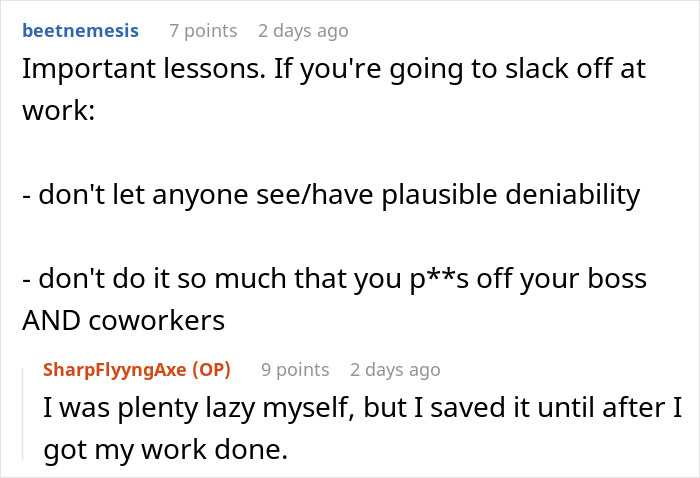
The internet saluted the author for taking action instead of ignoring the toxic situation


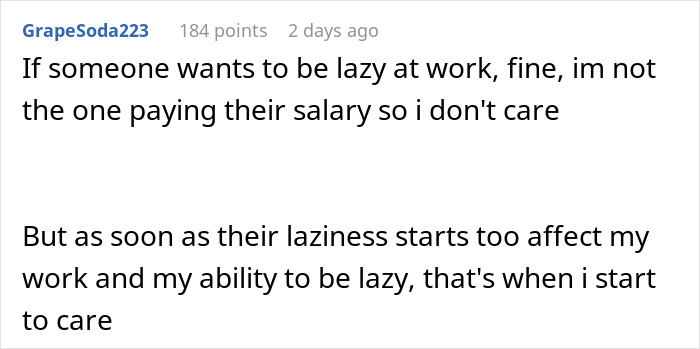






A few internet users opened up about how they’ve been in similar situations. Here are their stories
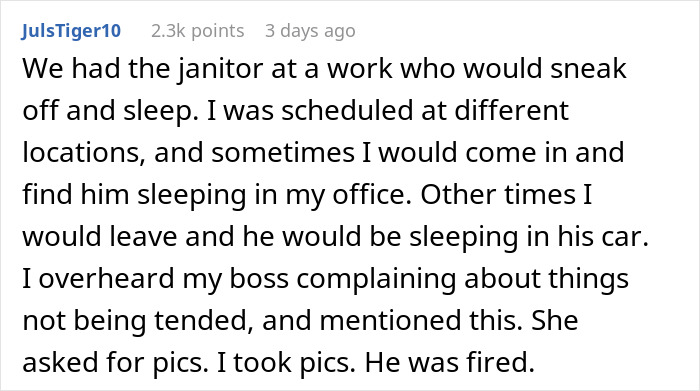

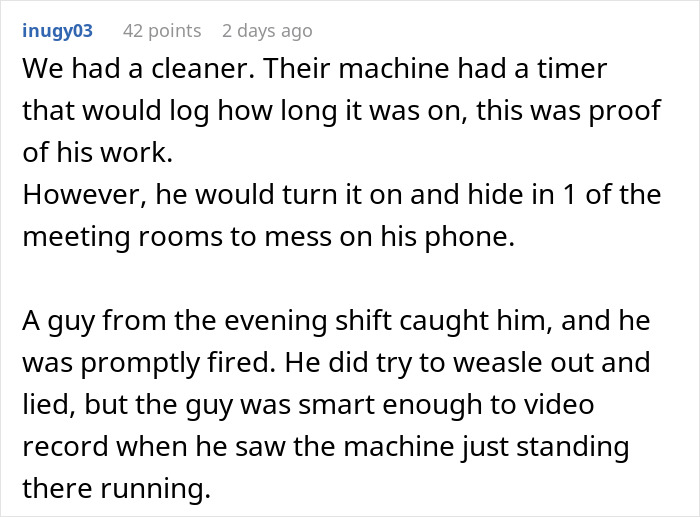

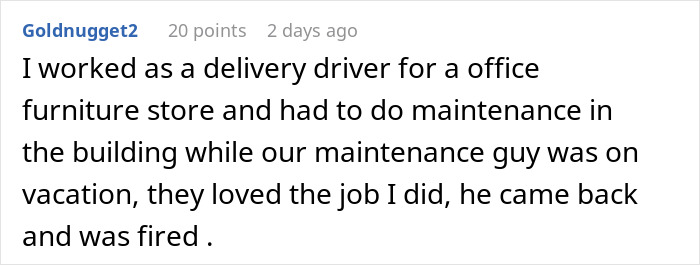
The post Man Gets The New Guy Fired And Blacklisted For Making Him Work More Than He’s Supposed To first appeared on Bored Panda.
from Bored Panda https://ift.tt/urPeTvS
via IFTTT source site : boredpanda